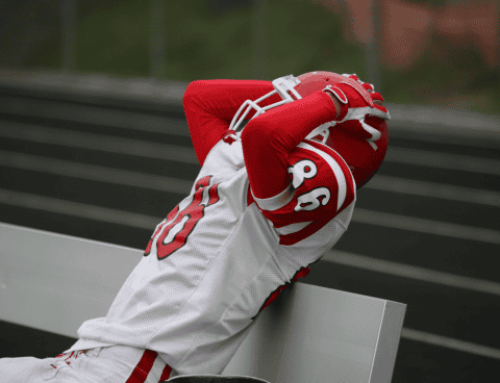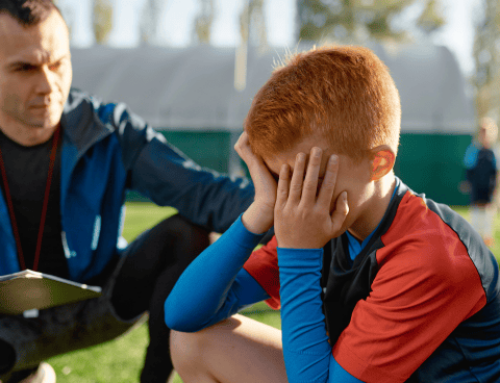How To Let Go Of Mistakes
Mistakes are a part of life, but they don’t feel that way at the time. It often feels like you are the only person in the world who would have made that mistake sometimes. The truth is, that’s not the case at all. And in athletic competitions, nothing is ever as easy as you expect it to be. Even the pros make mistakes constantly.
The best basketball players to have ever lived don’t have anywhere close to a perfect free-throw percentage. Case in point, a famous critique of the great Shaquille O’Neal is that he was (and probably still is) bad at shooting free throws. His career percentage… 52.7%. And why is that? There is no one in the way. He is shooting from the free-throw line that he’s shot from thousands, maybe hundreds of thousands of times before including practice.
The point is that mistakes happen at every level of every sport that has ever been played. What makes a player great isn’t avoiding mistakes, but letting go of the mistakes that they do make. Do you know how many interceptions Brett Favre threw in his career? 336. That’s a lot of mistakes. Do you know the most interceptions ever thrown in just one game? EIGHT. George Blanda threw 8 interceptions in a single game. He threw 42 in a single season. And He is in the professional football Hall of Fame. Mistakes happen; the trick is letting them go.
Tips For Letting Go Of Mistakes:
Tip 1: Use Mistakes as Fuel
The first step to getting over mistakes is to realize all of the positive things that can come from making a true, accidental mistake. Mistakes give you perspective. They provide you with the tools to see what you’ve been neglecting and to light a fire under you to get your game back on track. Think of when the University of Florida suffered a loss early in the 2008 season that could have derailed their championship hopes. The quarterback, Tim Tebow, took ownership of his mistakes and promised everyone rooting for the Gators that he would be better, that he would work harder than anyone else in football, and that the Gators would come back with a vengeance. They did exactly that and won the National Championship that year.
Tip 2: Use Mistakes as Growth
With mistakes comes the mental toughness to conquer those mistakes. Sports are a part of life that teach you countless valuable skills and habits that will make you successful in your adulthood. Making mistakes and momentary failures are challenges placed in front of you to conquer. When you conquer them, your mind becomes better able to handle adversity and challenge, making you better able to handle whatever life throws at you.
Mistakes happen, and they don’t feel good. And that’s fine. Get mad at yourself for a moment, but then get over it. You’re stronger now than you were before and you have the maturity to overcome those mistakes and continue to drive forward.
Tip 3: Use Mistakes to Fine-Tune Your Performance
When mistakes happen, and they will happen, take some time to think about how that mistake happened and what you can learn from it:
Common Mistakes We All Make
Did you mix up the play?
It can be easy to get confused if it is a route, formation, or game plan that you’re not
used to. Study the playbook and learn the coach’s strategy better so you all can be on the same page.
Were you overly anxious or overthinking your movements?
It’s called many things in sports: being in your head too much, the jitters, choking, overthinking. Whatever it is, it is because your stress level is not optimal for your abilities. Some people play best when they are highly stressed and anxious, while others play at their best when they are completely calm. For most, it’s somewhere in the middle.
Athletes use many techniques either to amp themselves up to their optimal level or calm themselves to the right level. Find your technique to get in the zone.
Were you not paying enough attention?
As funny as it sounds, many athletes make a mistake because they just happened to be thinking about something else at the time. Maybe you were thinking about that math test that you felt like you bombed, or maybe the person you’re dating didn’t text you back today. Daydreams and stray thoughts can wander in and take you right out of the game. My advice—be present.
There’s nothing you can think about during the game that’s going to have any payoff for you. Even things you stress or worry about, stressing and worrying right now isn’t going to fix them. Leave all your non-game-related thoughts on the sidelines or in the dugout where they belong. When your present, be present.
Have you not practiced enough for your sport?
Sometimes the reason is a very simple one. You dropped a pop fly because you hardly ever practice catching pop flies. Simple as that. To be great, or even good at a sport, you need to practice your skills multiple times a week, if not daily, to master the fundamentals and become more skilled than those around you. If you don’t put in the time to get better at the sport, you will likely make mistakes related to you not training enough.
That’s the nature of athletics, the best-prepared athlete tends to have the best performance. They make their mistakes in practice, and it’s much better to make mistakes in practice than during a game.
If you find that none of these things affected how you played or the mistake you made, then the answer very well could be that you didn’t make a mistake at all. Maybe there could have done nothing differently to prevent that bad outcome. Sometimes luck, fate, chance, or some strange occurrence happens that causes you to be the center of attention on a play that went wrong. Just because the play went wrong, doesn’t mean you did anything wrong. Blaming yourself for things outside your control is not helpful to anyone.
Learn To Proportion The Blame Objectively
Many things can lead to mistakes or losses, never just one. You may not be solely to blame for the loss, but neither are the circumstances or the refs. Accept that there are many contributing factors. So, put mistakes into proper perspective. Ask yourself, “What could I have done differently that would have changed the outcome?” “Were there things that affected the outcome that I couldn’t change?”
Letting go of mistakes isn’t easy, but it’s a skill that you can learn with a little practice. Mental fitness gets stronger with practice, just like physical fitness and skill. Next time you make a mistake, use the tips you’ve just read to redirect any feelings of anger or guilt into something useful.
RECOMMENDED FOR YOU
MOST POPULAR
How To Let Go Of Mistakes
Mistakes are a part of life, but they don’t feel that way at the time. It often feels like you are the only person in the world who would have made that mistake sometimes. The truth is, that’s not the case at all. And in athletic competitions, nothing is ever as easy as you expect it to be. Even the pros make mistakes constantly.
The best basketball players to have ever lived don’t have anywhere close to a perfect free-throw percentage. Case in point, a famous critique of the great Shaquille O’Neal is that he was (and probably still is) bad at shooting free throws. His career percentage… 52.7%. And why is that? There is no one in the way. He is shooting from the free-throw line that he’s shot from thousands, maybe hundreds of thousands of times before including practice.
The point is that mistakes happen at every level of every sport that has ever been played. What makes a player great isn’t avoiding mistakes, but letting go of the mistakes that they do make. Do you know how many interceptions Brett Favre threw in his career? 336. That’s a lot of mistakes. Do you know the most interceptions ever thrown in just one game? EIGHT. George Blanda threw 8 interceptions in a single game. He threw 42 in a single season. And He is in the professional football Hall of Fame. Mistakes happen; the trick is letting them go.
Tips For Letting Go Of Mistakes:
Tip 1: Use Mistakes as Fuel
The first step to getting over mistakes is to realize all of the positive things that can come from making a true, accidental mistake. Mistakes give you perspective. They provide you with the tools to see what you’ve been neglecting and to light a fire under you to get your game back on track. Think of when the University of Florida suffered a loss early in the 2008 season that could have derailed their championship hopes. The quarterback, Tim Tebow, took ownership of his mistakes and promised everyone rooting for the Gators that he would be better, that he would work harder than anyone else in football, and that the Gators would come back with a vengeance. They did exactly that and won the National Championship that year.
Tip 2: Use Mistakes as Growth
With mistakes comes the mental toughness to conquer those mistakes. Sports are a part of life that teach you countless valuable skills and habits that will make you successful in your adulthood. Making mistakes and momentary failures are challenges placed in front of you to conquer. When you conquer them, your mind becomes better able to handle adversity and challenge, making you better able to handle whatever life throws at you.
Mistakes happen, and they don’t feel good. And that’s fine. Get mad at yourself for a moment, but then get over it. You’re stronger now than you were before and you have the maturity to overcome those mistakes and continue to drive forward.
Tip 3: Use Mistakes to Fine-Tune Your Performance
When mistakes happen, and they will happen, take some time to think about how that mistake happened and what you can learn from it:
Common Mistakes We All Make
Did you mix up the play?
It can be easy to get confused if it is a route, formation, or game plan that you’re not
used to. Study the playbook and learn the coach’s strategy better so you all can be on the same page.
Were you overly anxious or overthinking your movements?
It’s called many things in sports: being in your head too much, the jitters, choking, overthinking. Whatever it is, it is because your stress level is not optimal for your abilities. Some people play best when they are highly stressed and anxious, while others play at their best when they are completely calm. For most, it’s somewhere in the middle.
Athletes use many techniques either to amp themselves up to their optimal level or calm themselves to the right level. Find your technique to get in the zone.
Were you not paying enough attention?
As funny as it sounds, many athletes make a mistake because they just happened to be thinking about something else at the time. Maybe you were thinking about that math test that you felt like you bombed, or maybe the person you’re dating didn’t text you back today. Daydreams and stray thoughts can wander in and take you right out of the game. My advice—be present.
There’s nothing you can think about during the game that’s going to have any payoff for you. Even things you stress or worry about, stressing and worrying right now isn’t going to fix them. Leave all your non-game-related thoughts on the sidelines or in the dugout where they belong. When your present, be present.
Have you not practiced enough for your sport?
Sometimes the reason is a very simple one. You dropped a pop fly because you hardly ever practice catching pop flies. Simple as that. To be great, or even good at a sport, you need to practice your skills multiple times a week, if not daily, to master the fundamentals and become more skilled than those around you. If you don’t put in the time to get better at the sport, you will likely make mistakes related to you not training enough.
That’s the nature of athletics, the best-prepared athlete tends to have the best performance. They make their mistakes in practice, and it’s much better to make mistakes in practice than during a game.
If you find that none of these things affected how you played or the mistake you made, then the answer very well could be that you didn’t make a mistake at all. Maybe there could have done nothing differently to prevent that bad outcome. Sometimes luck, fate, chance, or some strange occurrence happens that causes you to be the center of attention on a play that went wrong. Just because the play went wrong, doesn’t mean you did anything wrong. Blaming yourself for things outside your control is not helpful to anyone.
Learn To Proportion The Blame Objectively
Many things can lead to mistakes or losses, never just one. You may not be solely to blame for the loss, but neither are the circumstances or the refs. Accept that there are many contributing factors. So, put mistakes into proper perspective. Ask yourself, “What could I have done differently that would have changed the outcome?” “Were there things that affected the outcome that I couldn’t change?”
Letting go of mistakes isn’t easy, but it’s a skill that you can learn with a little practice. Mental fitness gets stronger with practice, just like physical fitness and skill. Next time you make a mistake, use the tips you’ve just read to redirect any feelings of anger or guilt into something useful.











